Ohel Jakob Synagogue in Munich
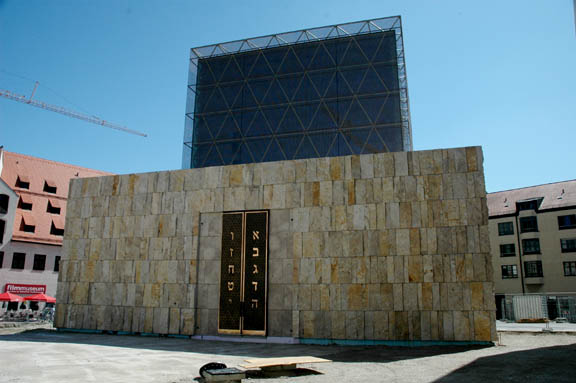
Front door of Ohel
Jakob Synagogue in Munich Germany
On March 22, 2007, the 74th anniversary
of the opening of the Dachau concentration camp, a new Jewish
Museum and a Jewish Center were opened in the heart of Munich,
next to the new Synagogue, named Ohel Jakob, which is shown in
the photo above.
The new Ohel Jakob Synagogue was opened
on November 9, 2006, the 68th anniversary of the destruction
of the old Synagogue with the same name during the pogrom known
as Kristallnacht, or the Night of Broken Glass, when the windows
of Jewish stores were smashed and Synagogues were burned throughout
Germany and Austria.
At the cornerstone-laying ceremony for
the new Synagogue on November 9, 2003, four hundred Munich policemen
stood guard. A group of neo-Nazis attempted to bomb the construction
site but the plot was foiled by the police and the perpetrators
were arrested and sent to prison.
The Synagogue has around the clock security
and every visitor is required to go through a metal detector
before entry.
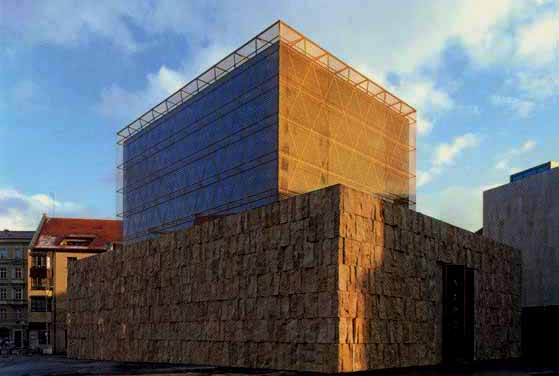
Ohel Jakob Synagogue
in Munich
The new Synagogue, which was built to
resemble what is believed to have been the design of Solomon's
temple in Jerusalem, is shown in the photo above. The base of
the building is made of stone, making it evocative of the Wailing
Wall in Jerusalem. The top of the building is a glass cube which
glows at night.
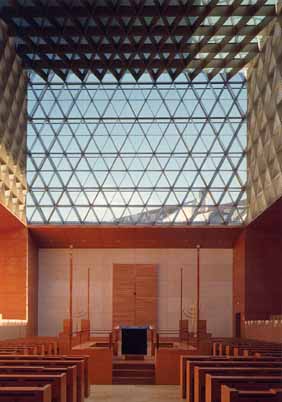
Interior of Obel Jakob
Synagogue
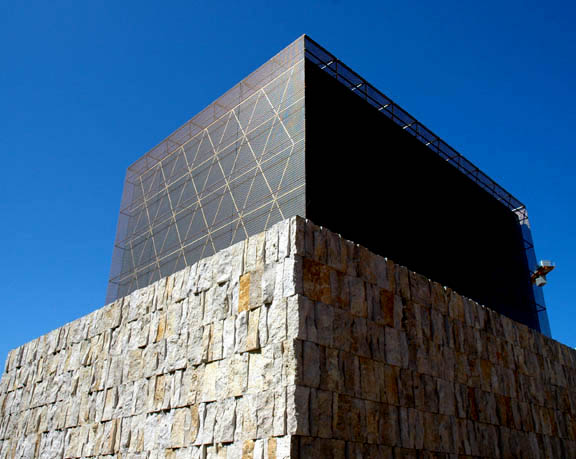
Top of Munich Synagogue
The Jewish Center, built at a cost of
71.6 million euro, or the equivalent of $91 million, is the largest
Jewish construction project in Europe. It was paid for by the
city of Munich, the state of Bavaria and the Jewish Community.
Today, there are 9,300 Jews in Munich, the second largest Jewish
Community in Germany. The majority of them are recent immigrants
from the former Soviet Union.
A model of the three new Jewish buildings
in the Munich Altstadt is shown in the photo below.
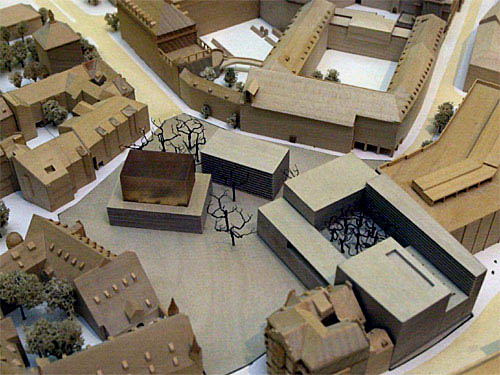
Synagogue, Jewish Museum
and Jewish Center in Munich
Photo Credit: www.weichlein.com
The photo below shows a view of the Synagogue
through a window of the coffee shop in the Jewish Museum building
next door.
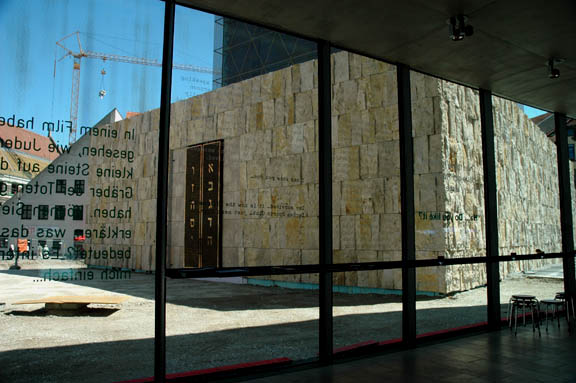
View of the Synagogue
through the window of the Jewish Museum
Construction of the Jewish Center on
Munich's historic Sankt-Jakobs-Platz began in 2003. The three
buildings include a Museum, a Community Center, a day school,
a library and a kosher restaurant. The restaurant, museum and
the large assembly hall are open to the general public. An underground
passage connecting two of the building has the names of the 4,500
Munich Jews who were murdered by the Nazis during the Holocaust.
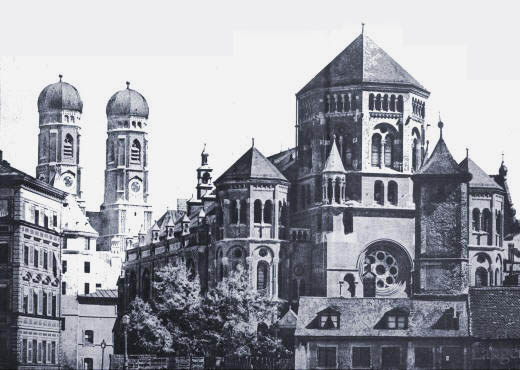
Main Synagogue in Munich
was torn down on June 9, 1938
In 1882, King Ludwig II of Bavaria gave
the Jews a site on Herzog-Max-Strasse in the town center of Munich
on which they built a Synagogue in 1887. In the background in
the photo above is the Frauenkirche, a Munich land mark which
is still standing. The site of the old Synagogue is now a parking
lot, but the new Synagogue is located very close to this spot.
After Hitler called the old Synagogue
"an eyesore," demolition began on June 9, 1938. Five
months later, on November 9, 1938, the old Ohel Jakob Synagogue
was destroyed and 30,000 Jewish men in Germany and Austria were
arrested and sent to the three main Nazi concentration camps:
Dachau, Buchenwald and Sachsenhausen.
A copper cylinder was rescued from the
cornerstone of the old Synagogue; it was placed in a niche on
the wall of the new Synagogue.
The small Synagogue on Reichenbach Strasse
in Munich survived the 1938 pogrom, although it was damaged.
After World War II ended in 1945, the few remaining Jews in Munich
worshiped in the Reichenbachstrasse Synagogue, which was located
far from the Munich Altstadt (old city).
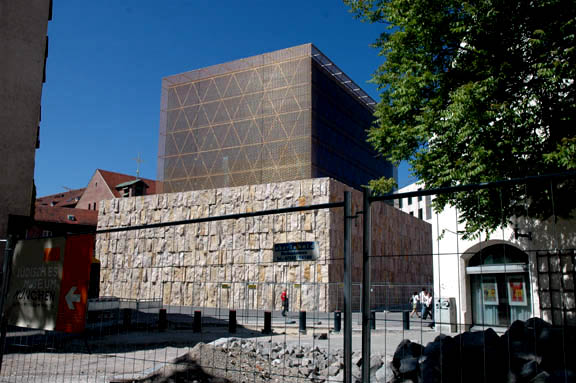
New construction near
the Munich Synagogue
The location of the new Jewish Center
is very crowded and the new Synagogue seems to be out of place,
squeezed into a space that is too small and dominated by traditional
buildings. New construction was still going on in the area when
I visited in May 2007.
The back side of the Synagogue, shown
in the photo above, is directly across from the German History
Museum.
Munich was severely damaged by Allied
bombs during World War II and after the war, the decision was
made to reconstruct the old buildings, rather than build new
modern buildings as was done in Frankfurt. The new Jewish Synagogue
is virtually the only modern building in downtown Munich.
Services in the Synagogue, which are
conducted in Hebrew, follow Jewish Orthodox traditions, although
everyone is welcome. As is the custom in Orthodox synagogues,
the men sit in the main part of the sanctuary and the women sit
in the balcony.
Back to Munich
Home
This page was created on June 1, 2007
|